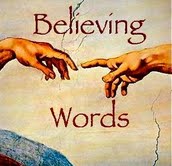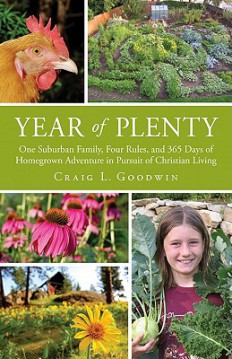How often we underestimate the power of a story to bring about change.
One inspiring book has me thinking that I can do things different this time of year — that Jesus and worship and spiritual disciplines and the fruit of the Spirit can make a recognizable difference in how I live. This season I owe the anticipation of having an abundant Christmas with less to the Rev. Dr. Craig Goodwin for his book “Year of Plenty” (Sparkhouse Press, 2011). It features the inspiring account of one suburban family's choice to revamp their spending habits for 365 days according to the following rules: local, used, homegrown, homemade, and (coffee) from Thailand.

Not about Christmas per se, the book details how their idea to consume items only from local, used, homegrown, homemade, and Thai sources germinated shortly after Christmas of 2007. Familiar post-Christmas feelings of regret and exhaustion had set in as Pastors Craig and Nancy sat in a Seattle-based Thai restaurant. Wanting things to be different, they moved their conversation to a Starbucks to begin exploring the idea of living the next year in such a way that, unbeknownst to them, would connect them with local farmers, local dairy and wheat factories, local businesses, local artisans. At the end of the 365 days they would take a family trip to Thailand.

Little did they know at the start they would discover a universal take away of balancing consumption and stewardship of the earth. For the first time they were about to experience first hand the impact of their buying and consuming on the environment. Further, that to segregate environmental concerns to the political realm or certain religious groups is to deny humanity's interdependence with nature.
Other invaluable lessons abounded for the Goodwin family. Besides gaining awareness of the origins of the meat, vegetables, wheat, etc. they consumed from local sources, they learned the value of turning their suburban yard into a vegetable garden and small chicken farm. They discovered the importance of time together. Walking the girls to school on an unfamiliar path through trees, or the adventure of finding a birthday gift 40 minutes away, or making a piata, or adjusting to one vehicle — these proved unforgettable moments of making due, building memories, bonding, imagining, thinking before spending, and relying on creativity.
The book raises some unsettling questions. Who supplies the food I buy and eat? What was life-like for the animal whose meat I prepare? Why does a local farmer's squash go to waste in a barn as supermarkets fill their bins with squash from Mexico? How connected am I to the people who make, grow and raise the things I purchase and consume? How many of us can relate to the post-Christmas let down that the Goodwins experienced?
This brings me to the propensity that Americans have to keep going, to over spend and over consume. We ramp up rather than slow down, curiously, during one of the holiest times of the year. We see no way around everything to do in a few short weeks — send cards, spend money, save money on great deals, bake, shop, wrap, cookie exchanges, bizarres, clean, decorate, travel, parties, concerts. With the rush here I wonder how many employees on Black Friday have to put in long hours at a time meant for loved ones and giving thanks for our daily bread, regardless of where we fall on the income scale.
Consumerism drives American culture. It is for the well-being of our economy. What it does to our spiritual well-being, however, is a different matter. Personally, it helps that the family budget is tight because I don't like to shop. So I've never taken part in the biggest shopping day of the year. I do have memories of it though. Memories in stories. Stories of protesting employees. Stories of people camping out in frigid temperatures or people getting up in the middle of night to get the best deals. One woman, a wealthy church-goer, said she returns home on Black Friday when her SUV cannot hold anymore stuff. The hardest stories to accept and forget are of people who get trampled to death trying to get into the store. How often a story fails to bring about change. Something else is at stake with our rituals this time of year. For they involve Christians and non-Christians alike, leaving no distinction between believers and non-believers in our culture of Christmas. Most live largely unaware of the extent to which advertisements and pressures influence their holiday preparations.
The total amount of money spent on advertising in the US each year reaches over 1000 billion dollars, alluring us to acquire more, more, more. There is a simple answer as to why advertising is so popular: it works. Ads tap something in the human psyche called vulnerability. If only we had this advertised thing, then we would be worth something. We would look good. We would be accepted. We would matter. A question follows: if our rituals leading up to Christmas fail to distinguish us as Christ-followers in the world, then what does? For the answer, we look to a season in the life of the church unparalleled in the world. Advent. What makes Advent so powerful? The story does — a nearly 2,000 year-old story of a baby coming to transform and leave us in a different place from where we've been.
How often we underestimate the power of a story to bring about change. “Year of Plenty” too is a story of transformation. Goodwin's book has led me to reflect on cultivating a life of simplicity and to pay attention to what I buy. It is both challenging and convicting to simplify, to de-clutter the garage, cupboards, drawers, and closets. Nonetheless I've taken some preliminary steps, starting with some changes to experience this Christmas from a place of contentment rather than consumption. Suddenly, the word 'plenty' calls to mind parts of Scripture that I've paid little attention to in the past, stories that remind me of God's 'sufficient' grace, of finding 'fulfillment' in God's love, of having 'enough' for this day.
After reading “Year of Plenty“, I have begun to reflect on how to make this Christmas less hectic and more fulfilling, less expensive and more about people than stuff. While inflated snowmen and decorated faux trees began appearing in the big-box stores weeks ago, some of my family members agreed to a new ritual of drawing one name and shopping for just that one person at a cap of $25. It replaces the custom I grew up with, the one most of us cannot really afford, of buying several unnecessary or unwanted gifts for each family member (the 'Chef's Envy' vegetable-slicing tool set given to us last Christmas remains in the cupboard unused). With friends, the plan is to forego gift giving and just spend time together. I hope to fulfill what the Rev. Dr. Samuel Wells wished for in his 2010 Christmas Eve address of finding Emmanuel in being with instead of doing for. The Goodwins serve as pastors of Millwood Presbyterian Church in Spokane.









Very timely and thought provoking article. I’m going to use it to set the tone for this Christmas season.
I love this! It sounds like a good way to find peace and have an adventure.
It’s so rare for anyone to ask the question that nags at all of us: why are we doing all this crazy stuff to ourselves in the name of Christmas? Thanks for sharing the great questions that were raised for you by reading this book, and for describing the alternatives you came up with, such as spending time with friends instead of exchanging gifts. I hope to read this book soon!